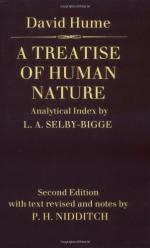
|
| Name: _________________________ | Period: ___________________ |
This test consists of 15 multiple choice questions and 5 short answer questions.
Multiple Choice Questions
1. To what does Hume say virtue is tied?
(a) Inability.
(b) Agreeableness.
(c) Disagreeableness.
(d) Ability.
2. Which of the following is a quality that gives rise to moral sentiment?
(a) Humor.
(b) Qualities useful to self.
(c) Listening.
(d) Conversation skills.
3. When does one feel the impression of volition?
(a) Whenever one desires good.
(b) Whenever one desires hate.
(c) Whenever one desires company.
(d) Whenever one desires love.
4. What does Hume say we need to stop men from fighting?
(a) Social units.
(b) Children.
(c) Sport.
(d) Women.
5. What is the title of Book Three, Part Three?
(a) Of Love and Hate.
(b) Of the Other Virtues and Vices.
(c) Of Knowledge and Forgetting.
(d) Of Sympathy.
6. What kind of people does Hume say don't understand justice?
(a) Criminals.
(b) Morally corrupt people.
(c) People with mental illness.
(d) Morally primitive people.
7. Into what two types does Hume divide direct passions?
(a) Those which respond to pain and those which are natural instincts.
(b) Those which respond to hate and those which respond to love.
(c) Those which are comfortable and those which are uncomfortable.
(d) Those which we understand and thosewhich we misunderstand.
8. What is the title of Book Two, Part Three?
(a) Of the Will and Direct Passions.
(b) Of Justice and Morality.
(c) Of Free Will and Indirect Passion.
(d) Of Love and Hate.
9. What is the title of Book Three, Part Two?
(a) Of Religion and Atheism.
(b) Of Morals and Immorals.
(c) Of Justice and Injustice.
(d) Of Love and Hate.
10. What kind of passion does Hume say is a mistake to confuse as reason?
(a) Violent passions.
(b) Calm passions.
(c) Fun passions.
(d) Extreme passions.
11. What does Hume think a proper understanding of the will help us to understand?
(a) Love.
(b) Free will.
(c) The passions.
(d) Death.
12. Which of the following is a group of contrary?
(a) Pity and malice.
(b) Love and hate.
(c) Respect and contempt.
(d) Benevolence and anger.
13. How does Hume define anger?
(a) The desire to cause pain to someone you hate.
(b) The need to scream and shout at the nearest object.
(c) The desire to be alone.
(d) The desire to be self-destructive.
14. What virtue does Hume claim is needed to maintain the family unit?
(a) Chastity.
(b) Honesty.
(c) Loyalty.
(d) Love.
15. What kind of point of view does sympathy allow us to take?
(a) An individual point of view.
(b) A general point of view.
(c) A personable point of view.
(d) A subjective point of view.
Short Answer Questions
1. What does Hume say none of his three motives of human nature are sufficient enough to produce?
2. What determines whether action is good or bad?
3. What kind of people does Hume say we admire?
4. Who does Hume say must be bound to family in order for it to work?
5. When does Hume say self-interested motives can be taken to be virtuous?
|
This section contains 480 words (approx. 2 pages at 300 words per page) |

|




